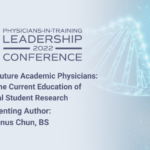Abstract | April 6, 2022
Educating Our Future Academic Physicians: A Look at the Current Education of Medical Student Research
Learning Objectives
- Although medical students are strongly interested in conducting clinical research, there is a lack of education on clinical research provided.
Background: Training medical students in clinical research early in their medical education has proven to be beneficial. However, to our knowledge, limited studies analyze this from the viewpoint of medical students. Here, we provide outcomes and suggestions to improve research education for medical students.
Methods: An anonymous 17-question survey with 5-point Likert-scale was sent to medical students at a single medical institution to gauge responses to their perceived quality of clinical research training they have received in their medical education. It was sent to respondents prior to start of a research course and to those in the middle of taking the course. Demographics, exposure to research education, and perceptions of the current clinical research education provided to them were collected in the survey.
Results: There was a survey respondent rate of 100% (n=31) from our medical institution (average age = 25.1±1.9 years, 47.4% male). More than half of the respondents have never conducted any clinical research and only 7.7% of respondents responded that they are currently actively conducting clinical research during their medical education. After starting the course, 75% of respondents said they have been able to start working on research projects at our institution within 4 weeks. All respondents (100%) agreed or strongly agreed that it was important for medical students to be educated on clinical research. The majority of respondents (84%) agreed or strongly agreed that they have not been receiving adequate training in conducting clinical research. 95% of respondents agreed or strongly agreed that medical students should undergo more training than what is currently provided on clinical research and should be more readily available to medical students. Table 2 shows additional themes eliciting greater quantity of positive outcomes as compared to previous studies indicating a current need for more clinical research training.
Conclusion: Although medical students are strongly interested in conducting clinical research, there is a lack of education on clinical research provided. This is a pilot study at a single medical institution and we hope to enroll other institutions in our multi-center study to provide a collaborative environment for US medical institutions to advance research education.

